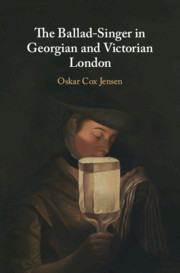Book contents
- The Ballad-Singer in Georgian and Victorian London
- The Ballad-Singer in Georgian and Victorian London
- Copyright page
- Contents
- Figures
- Tables
- Musical Examples
- Recordings
- Acknowledgements
- Note on the Text
- Abbreviations
- Introduction
- 1 Representations
- Interlude I
- 2 Progress
- Interlude II
- 3 Performance
- Interlude III
- 4 Repertoire
- Interlude IV
- Conclusion
- Bibliography
- Index
4 - Repertoire
Navigating the Mainstream
Published online by Cambridge University Press: 05 February 2021
- The Ballad-Singer in Georgian and Victorian London
- The Ballad-Singer in Georgian and Victorian London
- Copyright page
- Contents
- Figures
- Tables
- Musical Examples
- Recordings
- Acknowledgements
- Note on the Text
- Abbreviations
- Introduction
- 1 Representations
- Interlude I
- 2 Progress
- Interlude II
- 3 Performance
- Interlude III
- 4 Repertoire
- Interlude IV
- Conclusion
- Bibliography
- Index
Summary
This chapter explores singers’ repertoires, from whence they were derived, and their networks of dissemination, and centres on my formulation of a cultural ‘mainstream’ of songs. I begin by placing the notoriously mixed repertoires available to us within a theoretical framework of the miscellaneous as a form of cultural consumption, before moving beyond specific lists of songs to a consideration of historical process. I examine the remarkable ways in which singers appropriated tunes from other cultural spaces, and the varying methods by which a lyric might be sourced. I look at the question of circulation both within and without London, and the movement of songs between different physical and social sites, demonstrating in particular the overwhelming musical importance of the theatre to mainstream song culture. I construct an image of this ‘mainstream’ as a working model for understanding how songs were produced, performed, and consumed in an age before sound recording: a model that necessarily takes issue with Peter Burke’s influential theory of the separation of elite and popular cultures by 1800. As the century progressed and harmonic forms of songwriting, informed by keyboards, came to prominence, this cultural model was no longer tenable, and newly-literate workers with a slightly improved disposable income began to consume songs in both physical and performative forms that bypassed the ballad-singer.
Keywords
- Type
- Chapter
- Information
- The Ballad-Singer in Georgian and Victorian London , pp. 190 - 228Publisher: Cambridge University PressPrint publication year: 2021

